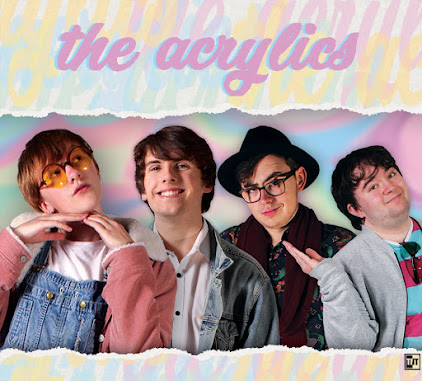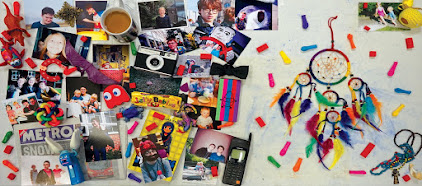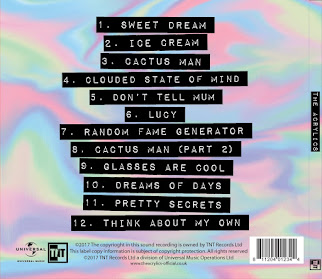The opening section from the film "The Hobbit: An Unexpected Journey." Click to play.
1) What genre is the film?
The film I have chosen is "The Hobbit: An Unexpected Journey." It is a fantasy film- this is quite evident from the realistic yet unfamiliar surroundings of the opening, and is confirmed by the shot of the map showing a world unlike and apart from our own. Intertextuality is also important in figuring out the genre, as this film is the first part of a prequel series to the Lord of the Rings fantasy series, and thus the names of the characters and even the settings and so on in this film are a reference to and referenced in the latter series.
2) Where does the story take place and what is the time scale?
This film is set solely in the house of the narrator, unnamed in the opening. However, he is writing about what is happening in the rest of the film- thus, as the film visually shows what he is writing, it is better to say that the film is set in the areas shown during the map shot, namely the starting area the Shire, the end point Dale, and presumably everything in between. The opening section is around 4 minutes long, and a whole chunk of what is considered history in-universe is covered in this period.
3) Is it possible to summarise what happens in this sequence? How significant is the storytelling in the order of event?
In this sequence, the first introduced character starts to recount important events from his life, in fact starting with events before his involvement to ensure readers of his book (and thus viewers of the film) have the required background knowledge- thus we learn that the majority of the film is almost a kind of voyeurism. He talks about an ancient city and the problems that lead to it's downfall and his involvement, introducing settings such as the city itself, characters such as the young dwarf prince and objects such as the Arkenstone, which are all implied to be later relevant to his main story (which I can confirm.) The order of the storytelling is important too. As this film is a prequel, starting the story in the future is quite important, as is then jumping back very far soon after- after all, the purpose of a prequel is to provide a substantial background to an already established storyline.
4) Do events link to each other, or are they distinct, unconnected events?
The original event of the first character sitting down and writing his book is the most unconnected event, as it takes place far in the future compared to the rest of the opening and the majority of the plot. However, as the film is just a visualisation of this one character's writing, everything is thus connected through his story. The opening he narrates is also somewhat distinct, as it takes place before his involvement in the plot, and serves as a background to the rest of the film, which is in itself a background to another film.
5) What characters are introduced, and what are their roles? How do we find this information out?
The first character that is introduced is the narrator for the rest of the film. The story is thus told from his perspective, apart from the short introduction to the events he takes part in. However, this introduction introduces a couple of new characters, all shown to be important to the plot, however one in particular is shown in an ominous light at the end of this segment and is thus implied to be one of the more important characters (and I can confirm this from my knowledge of the film again, which I feel obliged to mention now as I neglected to earlier, despite trying to take a neutral tone.)
6) How much story information is revealed and how is it revealed to the audience? What is deliberately withheld?
Here my own knowledge must come into play again. The amount of information revealed is both large yet not highly useful. We learn that the narrator is recounting his life through the fact that he is writing a book for someone, and we learn enough about this world's history to fully appreciate his story through his writings, which is quite a lot of information, but at this point we are deliberately and crucially not actually told exactly what his story is. In terms of narrative theory, we are actually viewing the new equilibrium right at the start of the film, before jumping back to the old equilibrium and being teased by the beginning of the disruption.
7) What does the audience need to know at the start of the film?
At the start of the film, all the audience needs to know is that the story being told is all being recounted by the character that is first introduced, as this sets out the framework for the film and its role as a prequel. They also have to know the background to his story, in order to fully appreciate it and allow it to fill its first role that was mentioned earlier. The audience does not need to know what is going to happen in the film, and in fact it is also quite good that they do not learn EVERYTHING about the backstory of the film- the grand adventure and everything learned and gained along the way is a key part of fantasy films, and this one is no different in that respect.
4) Do events link to each other, or are they distinct, unconnected events?
The original event of the first character sitting down and writing his book is the most unconnected event, as it takes place far in the future compared to the rest of the opening and the majority of the plot. However, as the film is just a visualisation of this one character's writing, everything is thus connected through his story. The opening he narrates is also somewhat distinct, as it takes place before his involvement in the plot, and serves as a background to the rest of the film, which is in itself a background to another film.
5) What characters are introduced, and what are their roles? How do we find this information out?
The first character that is introduced is the narrator for the rest of the film. The story is thus told from his perspective, apart from the short introduction to the events he takes part in. However, this introduction introduces a couple of new characters, all shown to be important to the plot, however one in particular is shown in an ominous light at the end of this segment and is thus implied to be one of the more important characters (and I can confirm this from my knowledge of the film again, which I feel obliged to mention now as I neglected to earlier, despite trying to take a neutral tone.)
6) How much story information is revealed and how is it revealed to the audience? What is deliberately withheld?
Here my own knowledge must come into play again. The amount of information revealed is both large yet not highly useful. We learn that the narrator is recounting his life through the fact that he is writing a book for someone, and we learn enough about this world's history to fully appreciate his story through his writings, which is quite a lot of information, but at this point we are deliberately and crucially not actually told exactly what his story is. In terms of narrative theory, we are actually viewing the new equilibrium right at the start of the film, before jumping back to the old equilibrium and being teased by the beginning of the disruption.
7) What does the audience need to know at the start of the film?
At the start of the film, all the audience needs to know is that the story being told is all being recounted by the character that is first introduced, as this sets out the framework for the film and its role as a prequel. They also have to know the background to his story, in order to fully appreciate it and allow it to fill its first role that was mentioned earlier. The audience does not need to know what is going to happen in the film, and in fact it is also quite good that they do not learn EVERYTHING about the backstory of the film- the grand adventure and everything learned and gained along the way is a key part of fantasy films, and this one is no different in that respect.




You have written two pieces of excellent analysis. Both your film still and opening sequence show very good understanding of genre and narrative and you have attempted to incorporate some relevant theory. Just one EBI: to include more detailed technical detail in your analysis. Keep up this high standard!
ReplyDeleteYou have written two pieces of excellent analysis. Both your film still and opening sequence show very good understanding of genre and narrative and you have attempted to incorporate some relevant theory. Just one EBI: to include more detailed technical detail in your analysis. Keep up this high standard!
ReplyDelete